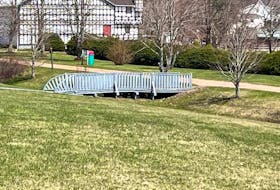CHARLOTTETOWN, P.E.I. — A class action lawsuit involving disability supports for people with mental illness is going ahead after a recent decision out of P.E.I.’s Supreme Court.
In his decision, Justice Gregory Cann said he was satisfied the requirements to have the lawsuit proceed as a class action have been met.
A class action lawsuit is initiated by one or more people on behalf of a larger group.
In this case, Laura King and Nathan Dawson are the plaintiffs who sought certification with a motion to have the class defined as all living people currently or formerly resident of P.E.I. since Oct. 1, 2001 who claim to suffer or have suffered from a mental disability.
King has been involved with the fight for inclusion of people with mental illness in the province’s disability support program for several years.
Her mother, Millie King, filed a human rights complaint on her daughter’s behalf, which saw a P.E.I. Human Rights Commission panel rule in 2016 that the program was discriminatory.
The panel ordered the government to pay Laura $15,000 in damages and $16,000 in costs.
In response to that decision the government sought a judicial review, which eventually ended up before the P.E.I. Court of Appeal.
The court of appeal found the panel made findings and conclusions that were reasonable and upheld its decision.
Since the initial human rights panel decision, the provincial government expanded its support program and renamed it AccessAbility Supports.
With his decision, Cann directed the plaintiffs to file an amended litigation plan that sets out their views related to individual issues and proposed methodology for resolution.









